By Emelie Whiting · Thursday, December 8, 2011 As an occasional feature on TELOSscope, we highlight a past Telos article whose critical insights continue to illuminate our thinking and challenge our assumptions. Today, Emelie Whiting looks at Mark W. Rectanus’s “Performing Knowledge: Cultural Discourses, Knowledge Communities, and Youth Culture,” from Telos 150 (Spring 2010).
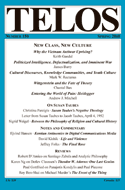 Academic discourse in the twenty-first century has undergone profound transformations. With new methods of knowledge production and consumption brought about by an increase in electronic resources and databases as well as the advent of social networking, there have been widespread changes in scholarly publishing, centers of knowledge, and knowledge communities. In his article “Performing Knowledge: Cultural Discourses, Knowledge Communities, and Youth Culture,” Mark W. Rectanus provides a compelling look at the shift in the significance and acquisition of knowledge resulting from changes in the publishing industry, literary reception, and access to different kinds of information as they stand in relation to a new “pedagogy of media”—a new way of teaching and learning in our technologically advanced age. Rectanus asserts that such developments require a revised conception of what it means to acquire knowledge as well as what constitutes scholarly knowledge. Academic discourse in the twenty-first century has undergone profound transformations. With new methods of knowledge production and consumption brought about by an increase in electronic resources and databases as well as the advent of social networking, there have been widespread changes in scholarly publishing, centers of knowledge, and knowledge communities. In his article “Performing Knowledge: Cultural Discourses, Knowledge Communities, and Youth Culture,” Mark W. Rectanus provides a compelling look at the shift in the significance and acquisition of knowledge resulting from changes in the publishing industry, literary reception, and access to different kinds of information as they stand in relation to a new “pedagogy of media”—a new way of teaching and learning in our technologically advanced age. Rectanus asserts that such developments require a revised conception of what it means to acquire knowledge as well as what constitutes scholarly knowledge.
Continue reading →
By Michael Bacal · Tuesday, November 29, 2011 As an occasional feature on TELOSscope, we highlight a past Telos article whose critical insights continue to illuminate our thinking and challenge our assumptions. Today, Michael Bacal looks at Howard Eiland’s “Superimposition in Walter Benjamin’s Arcades Projects,” from Telos 138 (Spring 2007).
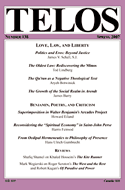 Walter Benjamin’s Arcades Project is likely the most jarring and ambitious work of cultural history of the twentieth century. Breathtaking in its scope, brilliant in its insight, and stamped throughout with his inimitable style, it is the unfinished, thirteen-year project Benjamin attempted as an encyclopedic capture of the emergence of Paris as the capital of the nineteenth century. Touching on everything from urban development to literary analysis and revolutionary consciousness, it presents a vast palimpsest of quotations, theoretical reflections, and minutiae taken from the most quotidian aspects of Parisian life. In a recent Telos article, Howard Eiland, one of the translators responsible for bringing the Passagenwerk into English, offers a compelling overview of Benjamin’s text and a stable set of theoretical coordinates with which to navigate it. His essay, “Superimposition in Walter Benjamin’s Arcades Project,” does this by putting forth the figure of the flâneur as the organizing locus of the book and by developing his unique experience of the world as central not only to the text but also to Benjamin’s theoretical project as a whole. By elaborating this through the notion of “superimposition,” Eiland outlines the singular experience of the flâneur and connects it with the broader historical and political dimensions to which it opens. Walter Benjamin’s Arcades Project is likely the most jarring and ambitious work of cultural history of the twentieth century. Breathtaking in its scope, brilliant in its insight, and stamped throughout with his inimitable style, it is the unfinished, thirteen-year project Benjamin attempted as an encyclopedic capture of the emergence of Paris as the capital of the nineteenth century. Touching on everything from urban development to literary analysis and revolutionary consciousness, it presents a vast palimpsest of quotations, theoretical reflections, and minutiae taken from the most quotidian aspects of Parisian life. In a recent Telos article, Howard Eiland, one of the translators responsible for bringing the Passagenwerk into English, offers a compelling overview of Benjamin’s text and a stable set of theoretical coordinates with which to navigate it. His essay, “Superimposition in Walter Benjamin’s Arcades Project,” does this by putting forth the figure of the flâneur as the organizing locus of the book and by developing his unique experience of the world as central not only to the text but also to Benjamin’s theoretical project as a whole. By elaborating this through the notion of “superimposition,” Eiland outlines the singular experience of the flâneur and connects it with the broader historical and political dimensions to which it opens.
Continue reading →
By Alwin Franke · Friday, November 11, 2011 As an occasional feature on TELOSscope, we highlight a past Telos article whose critical insights continue to illuminate our thinking and challenge our assumptions. Today, Alwin Franke looks at Ben Morgan’s “Developing the Modern Concept of the Self: The Trial of Meister Eckhart,” from Telos 116 (Summer 1999).
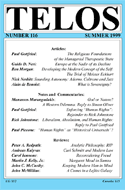 All subjectivization is a matter of drawing borders; a history of the subject is a history of the borders drawn to produce the self. Such a history of the borders, as suggested by Foucault, implies an investigation of both its sides—positivity and negativity. To write history, then, means to awaken the contemporary element in the historical, to construct constellations in which the present and the past enter into a state of sympathetic interdependence. Negativity, here, allows for the creation of counter-discourse. However, the relationship between positivity and negativity has been made all the more complex over the past decades. The borders have always been crossed indeed, but in the age of new capitalism we witness a constant blurring and redrawing of borders that allow for the incorporation of negativity into the system itself. All subjectivization is a matter of drawing borders; a history of the subject is a history of the borders drawn to produce the self. Such a history of the borders, as suggested by Foucault, implies an investigation of both its sides—positivity and negativity. To write history, then, means to awaken the contemporary element in the historical, to construct constellations in which the present and the past enter into a state of sympathetic interdependence. Negativity, here, allows for the creation of counter-discourse. However, the relationship between positivity and negativity has been made all the more complex over the past decades. The borders have always been crossed indeed, but in the age of new capitalism we witness a constant blurring and redrawing of borders that allow for the incorporation of negativity into the system itself.
Continue reading →
By Michael Bacal · Tuesday, November 8, 2011 As an occasional feature on TELOSscope, we highlight a past Telos article whose critical insights continue to illuminate our thinking and challenge our assumptions. Today, Michael Bacal looks at Daniel Pellerin’s “Nietzsche’s Affirming Negation of Christianity,” from Telos 124 (Summer 2002).
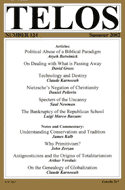 Could there really be such a thing as a “Christian” Nietzsche? Superficially, of course, there couldn’t be a thinker less Christian than Nietzsche. His savage critiques and well-known aphorisms about the servile, masochistic, and ugly character of Christian life have had a decisive influence on contemporary Western thought. His proclamations of God’s “death” and his analyses of ressentiment have even managed to lodge themselves firmly into popular culture. Nietzsche’s brutal hostility toward everything Christianity stands for is, for better or worse, one of the best-known aspects of his philosophy. It is, thus, rather fascinating that, in spite of this (or perhaps because of it), many theologians and philosophers have tried to answer this seemingly paradoxical question about a Christian Nietzsche in the affirmative. Could there really be such a thing as a “Christian” Nietzsche? Superficially, of course, there couldn’t be a thinker less Christian than Nietzsche. His savage critiques and well-known aphorisms about the servile, masochistic, and ugly character of Christian life have had a decisive influence on contemporary Western thought. His proclamations of God’s “death” and his analyses of ressentiment have even managed to lodge themselves firmly into popular culture. Nietzsche’s brutal hostility toward everything Christianity stands for is, for better or worse, one of the best-known aspects of his philosophy. It is, thus, rather fascinating that, in spite of this (or perhaps because of it), many theologians and philosophers have tried to answer this seemingly paradoxical question about a Christian Nietzsche in the affirmative.
Continue reading →
By Itai Farhi · Friday, November 4, 2011 As an occasional feature on TELOSscope, we highlight a past Telos article whose critical insights continue to illuminate our thinking and challenge our assumptions. Today, Itai Farhi looks at Anthony King’s “Baudrillard’s Nihilism and the End of Theory,” from Telos 112 (Summer 1998).
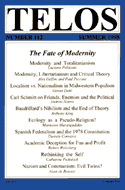 The discipline of critical theory, originating in the work of the Frankfurt School, attempts to move from pure description of society toward a critique of society with the goal of bringing about change. In recent years, this discipline has itself been criticized. One of the leaders of this anti-critical theory crusade was Jean Baudrillard, whose intellectual legacy in relation to the state of modern theory Anthony King evaluates in his article “Baudrillard’s Nihilism and the End of Theory.” The discipline of critical theory, originating in the work of the Frankfurt School, attempts to move from pure description of society toward a critique of society with the goal of bringing about change. In recent years, this discipline has itself been criticized. One of the leaders of this anti-critical theory crusade was Jean Baudrillard, whose intellectual legacy in relation to the state of modern theory Anthony King evaluates in his article “Baudrillard’s Nihilism and the End of Theory.”
Continue reading →
By James Fowler · Wednesday, October 26, 2011 As an occasional feature on TELOSscope, we highlight a past Telos article whose critical insights continue to illuminate our thinking and challenge our assumptions. Today, James Folwer looks at Anton Oleinik’s “On Negative Convergence: The Metaphor of Vodka-Cola Reconsidered” from Telos 145 (Winter 2008).
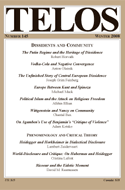 Since the fall of the Iron Curtain in 1990 there has been an accelerated process of negative convergence between the United States and Russia, encompassing transfers of knowledge, technologies, and institutions. The issue that Anton Oleinik tackles in “On Negative Convergence: The Metaphor of Vodka-Cola Reconsidered” is whether or not this process has helped us move toward a better, more inhabitant-friendly world. As Oleinik explains: “Change is bilateral: from the United States as well as to the United States. These transfers do not always contribute to improving the situation at either end of exchange. On the contrary, mechanisms of negative learning and mimicry operate that support a hypothesis of ‘negative convergence’: globalization in its current form produces a convergence of participating countries toward a constellation of common problems instead of moving toward a better world.” Since the fall of the Iron Curtain in 1990 there has been an accelerated process of negative convergence between the United States and Russia, encompassing transfers of knowledge, technologies, and institutions. The issue that Anton Oleinik tackles in “On Negative Convergence: The Metaphor of Vodka-Cola Reconsidered” is whether or not this process has helped us move toward a better, more inhabitant-friendly world. As Oleinik explains: “Change is bilateral: from the United States as well as to the United States. These transfers do not always contribute to improving the situation at either end of exchange. On the contrary, mechanisms of negative learning and mimicry operate that support a hypothesis of ‘negative convergence’: globalization in its current form produces a convergence of participating countries toward a constellation of common problems instead of moving toward a better world.”
Continue reading →
|
|
 Academic discourse in the twenty-first century has undergone profound transformations. With new methods of knowledge production and consumption brought about by an increase in electronic resources and databases as well as the advent of social networking, there have been widespread changes in scholarly publishing, centers of knowledge, and knowledge communities. In his article “Performing Knowledge: Cultural Discourses, Knowledge Communities, and Youth Culture,” Mark W. Rectanus provides a compelling look at the shift in the significance and acquisition of knowledge resulting from changes in the publishing industry, literary reception, and access to different kinds of information as they stand in relation to a new “pedagogy of media”—a new way of teaching and learning in our technologically advanced age. Rectanus asserts that such developments require a revised conception of what it means to acquire knowledge as well as what constitutes scholarly knowledge.
Academic discourse in the twenty-first century has undergone profound transformations. With new methods of knowledge production and consumption brought about by an increase in electronic resources and databases as well as the advent of social networking, there have been widespread changes in scholarly publishing, centers of knowledge, and knowledge communities. In his article “Performing Knowledge: Cultural Discourses, Knowledge Communities, and Youth Culture,” Mark W. Rectanus provides a compelling look at the shift in the significance and acquisition of knowledge resulting from changes in the publishing industry, literary reception, and access to different kinds of information as they stand in relation to a new “pedagogy of media”—a new way of teaching and learning in our technologically advanced age. Rectanus asserts that such developments require a revised conception of what it means to acquire knowledge as well as what constitutes scholarly knowledge.  Walter Benjamin’s Arcades Project is likely the most jarring and ambitious work of cultural history of the twentieth century. Breathtaking in its scope, brilliant in its insight, and stamped throughout with his inimitable style, it is the unfinished, thirteen-year project Benjamin attempted as an encyclopedic capture of the emergence of Paris as the capital of the nineteenth century. Touching on everything from urban development to literary analysis and revolutionary consciousness, it presents a vast palimpsest of quotations, theoretical reflections, and minutiae taken from the most quotidian aspects of Parisian life. In a recent Telos article, Howard Eiland, one of the translators responsible for bringing the Passagenwerk into English, offers a compelling overview of Benjamin’s text and a stable set of theoretical coordinates with which to navigate it. His essay, “Superimposition in Walter Benjamin’s Arcades Project,” does this by putting forth the figure of the flâneur as the organizing locus of the book and by developing his unique experience of the world as central not only to the text but also to Benjamin’s theoretical project as a whole. By elaborating this through the notion of “superimposition,” Eiland outlines the singular experience of the flâneur and connects it with the broader historical and political dimensions to which it opens.
Walter Benjamin’s Arcades Project is likely the most jarring and ambitious work of cultural history of the twentieth century. Breathtaking in its scope, brilliant in its insight, and stamped throughout with his inimitable style, it is the unfinished, thirteen-year project Benjamin attempted as an encyclopedic capture of the emergence of Paris as the capital of the nineteenth century. Touching on everything from urban development to literary analysis and revolutionary consciousness, it presents a vast palimpsest of quotations, theoretical reflections, and minutiae taken from the most quotidian aspects of Parisian life. In a recent Telos article, Howard Eiland, one of the translators responsible for bringing the Passagenwerk into English, offers a compelling overview of Benjamin’s text and a stable set of theoretical coordinates with which to navigate it. His essay, “Superimposition in Walter Benjamin’s Arcades Project,” does this by putting forth the figure of the flâneur as the organizing locus of the book and by developing his unique experience of the world as central not only to the text but also to Benjamin’s theoretical project as a whole. By elaborating this through the notion of “superimposition,” Eiland outlines the singular experience of the flâneur and connects it with the broader historical and political dimensions to which it opens.  All subjectivization is a matter of drawing borders; a history of the subject is a history of the borders drawn to produce the self. Such a history of the borders, as suggested by Foucault, implies an investigation of both its sides—positivity and negativity. To write history, then, means to awaken the contemporary element in the historical, to construct constellations in which the present and the past enter into a state of sympathetic interdependence. Negativity, here, allows for the creation of counter-discourse. However, the relationship between positivity and negativity has been made all the more complex over the past decades. The borders have always been crossed indeed, but in the age of new capitalism we witness a constant blurring and redrawing of borders that allow for the incorporation of negativity into the system itself.
All subjectivization is a matter of drawing borders; a history of the subject is a history of the borders drawn to produce the self. Such a history of the borders, as suggested by Foucault, implies an investigation of both its sides—positivity and negativity. To write history, then, means to awaken the contemporary element in the historical, to construct constellations in which the present and the past enter into a state of sympathetic interdependence. Negativity, here, allows for the creation of counter-discourse. However, the relationship between positivity and negativity has been made all the more complex over the past decades. The borders have always been crossed indeed, but in the age of new capitalism we witness a constant blurring and redrawing of borders that allow for the incorporation of negativity into the system itself.  Could there really be such a thing as a “Christian” Nietzsche? Superficially, of course, there couldn’t be a thinker less Christian than Nietzsche. His savage critiques and well-known aphorisms about the servile, masochistic, and ugly character of Christian life have had a decisive influence on contemporary Western thought. His proclamations of God’s “death” and his analyses of ressentiment have even managed to lodge themselves firmly into popular culture. Nietzsche’s brutal hostility toward everything Christianity stands for is, for better or worse, one of the best-known aspects of his philosophy. It is, thus, rather fascinating that, in spite of this (or perhaps because of it), many theologians and philosophers have tried to answer this seemingly paradoxical question about a Christian Nietzsche in the affirmative.
Could there really be such a thing as a “Christian” Nietzsche? Superficially, of course, there couldn’t be a thinker less Christian than Nietzsche. His savage critiques and well-known aphorisms about the servile, masochistic, and ugly character of Christian life have had a decisive influence on contemporary Western thought. His proclamations of God’s “death” and his analyses of ressentiment have even managed to lodge themselves firmly into popular culture. Nietzsche’s brutal hostility toward everything Christianity stands for is, for better or worse, one of the best-known aspects of his philosophy. It is, thus, rather fascinating that, in spite of this (or perhaps because of it), many theologians and philosophers have tried to answer this seemingly paradoxical question about a Christian Nietzsche in the affirmative. The discipline of critical theory, originating in the work of the Frankfurt School, attempts to move from pure description of society toward a critique of society with the goal of bringing about change. In recent years, this discipline has itself been criticized. One of the leaders of this anti-critical theory crusade was Jean Baudrillard, whose intellectual legacy in relation to the state of modern theory Anthony King evaluates in his article “Baudrillard’s Nihilism and the End of Theory.”
The discipline of critical theory, originating in the work of the Frankfurt School, attempts to move from pure description of society toward a critique of society with the goal of bringing about change. In recent years, this discipline has itself been criticized. One of the leaders of this anti-critical theory crusade was Jean Baudrillard, whose intellectual legacy in relation to the state of modern theory Anthony King evaluates in his article “Baudrillard’s Nihilism and the End of Theory.”  Since the fall of the Iron Curtain in 1990 there has been an accelerated process of negative convergence between the United States and Russia, encompassing transfers of knowledge, technologies, and institutions. The issue that Anton Oleinik tackles in “On Negative Convergence: The Metaphor of Vodka-Cola Reconsidered” is whether or not this process has helped us move toward a better, more inhabitant-friendly world. As Oleinik explains: “Change is bilateral: from the United States as well as to the United States. These transfers do not always contribute to improving the situation at either end of exchange. On the contrary, mechanisms of negative learning and mimicry operate that support a hypothesis of ‘negative convergence’: globalization in its current form produces a convergence of participating countries toward a constellation of common problems instead of moving toward a better world.”
Since the fall of the Iron Curtain in 1990 there has been an accelerated process of negative convergence between the United States and Russia, encompassing transfers of knowledge, technologies, and institutions. The issue that Anton Oleinik tackles in “On Negative Convergence: The Metaphor of Vodka-Cola Reconsidered” is whether or not this process has helped us move toward a better, more inhabitant-friendly world. As Oleinik explains: “Change is bilateral: from the United States as well as to the United States. These transfers do not always contribute to improving the situation at either end of exchange. On the contrary, mechanisms of negative learning and mimicry operate that support a hypothesis of ‘negative convergence’: globalization in its current form produces a convergence of participating countries toward a constellation of common problems instead of moving toward a better world.” 

